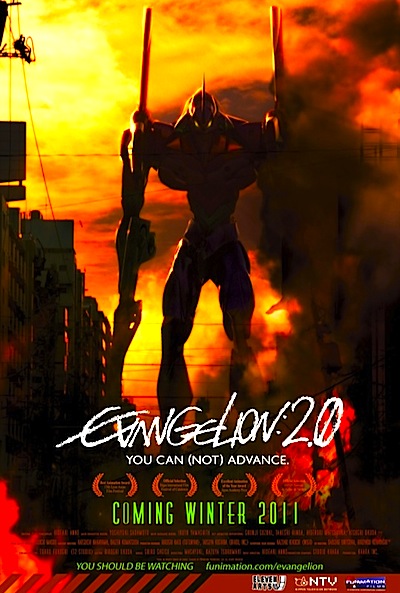By Joe Bendel. In the future, child labor laws will be loosened in Japan. It will be for a good cause though: the salvation of humanity. Only pre-teens can fit into the cockpit of the Evangelions, the huge cyborg-like fighting machines created to protect the earth from the otherworldly peril it faces. It is a grueling task that extracts a costly toll from the young pilots in Evangelion 2.0: You Can (Not) Advance, the second film in screenwriter and “chief director” Hideaki Anno’s big-screen “rebuild” of the popular Japanese anime, which opens this Friday in New York and San Francisco.
 As 2.0 opens, the Earth is once again under attack by “Angels,” hulking robotic extraterrestrial beings apparently impervious to all conventional weaponry. Shinji Ikari still flies his Eva unit in hopes of winning the approval of his severe father, who oversees NERV’s Evangelion program. His feelings for Rei, the emotionally fragile lead Eva pilot, continue to percolate. Into their midst comes a new pilot, Asuka, a Euro hotshot who arrives on the scene like Maverick at the Miramar TOPGUN school. Unfortunately, none of them expect the radical transformations in store for the Evas, nor the resulting implications for their own humanity.
As 2.0 opens, the Earth is once again under attack by “Angels,” hulking robotic extraterrestrial beings apparently impervious to all conventional weaponry. Shinji Ikari still flies his Eva unit in hopes of winning the approval of his severe father, who oversees NERV’s Evangelion program. His feelings for Rei, the emotionally fragile lead Eva pilot, continue to percolate. Into their midst comes a new pilot, Asuka, a Euro hotshot who arrives on the scene like Maverick at the Miramar TOPGUN school. Unfortunately, none of them expect the radical transformations in store for the Evas, nor the resulting implications for their own humanity.
Also crediting co-directors Masayuki and Kazuya Tsurumaki, 2.0 shrewdly incorporates proven elements from popular film and television, like the shadowy cabals of The X-Files and armored behemoths pounding each other silly, a la The Transformers. However, Anno’s anime utilizes strangely inverted Christian imagery, like the killer “Angels” that often explode into crosses when they are destroyed and “Lilith,” the life-giving angel, preserved beneath NERV central command disturbingly crucified on her cross. In fact, the original anime was somewhat notorious for its dense mythology, which has reportedly been streamlined for the rebuild. While its symbolism has the potential to become deeply troubling in future installments, for now it earns the first two Evangelions credit for ambition and novelty.
Frankly, elements of the meta-conspiracy revealed in 2.0 might even confuse those who saw 1.0, but most viewers going in cold will pick up enough to appreciate the rock-em-sock-em action sequences. Anime fanboys though might be disappointed by the lack of “fan service” aside from an Austin Powers shot of Asuka. Yet as animation, Evangelion represents the high-end of anime, featuring some rather striking imagery.
For those who sparingly partake of anime, the Evangelion series is one to check out. Smarter and more neurotic than the industry standard, it is an oddly compelling excursion into apocalyptic science fiction. Many theaters, including the Manhattan Big Cinemas (1/20) and the Viz Theater at New People (1/20) are screening 1.0 prior to 2.0’s opening (on the 21st both in New York and in San Francisco).
Posted on January 20th, 2011 at 1:08pm.
I was subjected to the original some time back by an American otaku who was big into anime soap opera. It marks the beginning of a story trend for “adult” oriented anime featuring young characters with huge angst where the story’s set up hooks are never really paid off at the end and left for the fanboys to ponder and argue about.
I suspect a major source of popularity for the series is the ongoing enthusiasm for the two tween female leads who, Japan being Japan, are the objects of lots of pornographic doujin and garage kits.